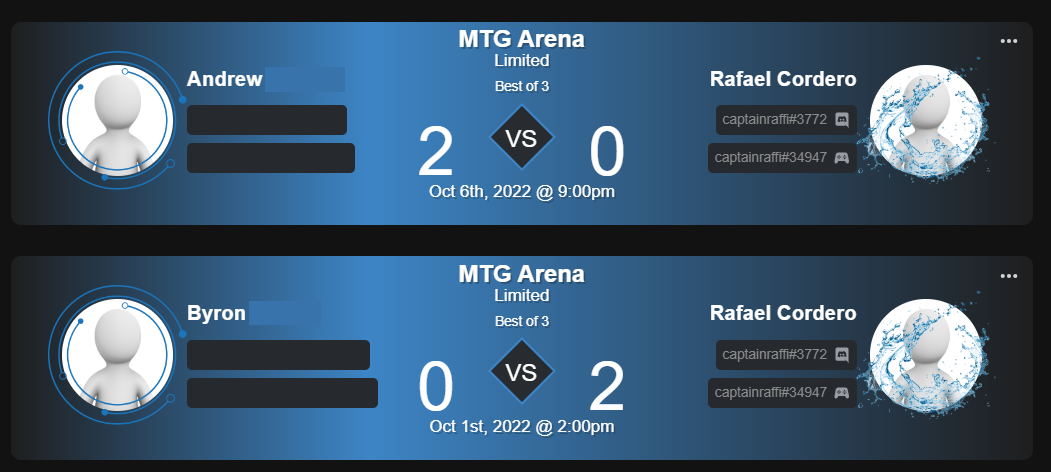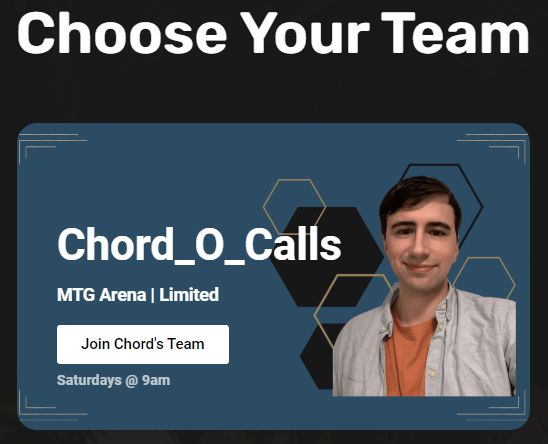I have a problem with competitive card games. Android: Netrunner, Doomtown: Reloaded, Legend of the Five Rings, Magic: The Gathering, Flesh & Blood…you name it and I’ve probably bought more than I needed to buy and lost nights of sleep as my brain locked in and overthought every aspect.
The issue is that I can usually get pretty good at these games, but I can’t get really good at them. And I don’t like that.
As the COVID lockdowns settled down and we had to accept that in-person gamenights were going to take a break one of my friends suggested that we all check out Magic Arena. An innocent enough suggestion, but one that would lead to a lot of sleepless nights.
Like most gamers I’d played Magic as a kid and a bit in college, but I’d never really gotten into it. That all changed when Arena introduced me to Limited formats. All of my concerns about “pay to win” or collecting cards went right out the window. Every new Draft or Sealed event was another opportunity to play games within games, testing my abilities as a drafter and as a player.

For the most part, I did pretty well! I cruised into Platinum in every format and even made it to Diamond a couple times. I managed some “Trophies” (the name for going 3-0 in Traditional Draft or winning 7 games in Premier or Quick Draft) as well, but I never made it to the Mythic Ranking. Diamond was my ceiling.
Then came Dominaria United.
I know nothing of the original Dominaria set, but all the podcasts and authors I follow (and there are many) were excited about this set. Previews came out hot and heavy with many content creators expressing guarded optimism that this might be one of the best Limited formats in years.
They were right.
The Dominaria United draft format has received nearly universal praise from the experts for its various archetypes, it’s deeply challenging draft, and the high skill ceiling that leads to mastery. This was great for the pros, but me? Well dear reader I tanked.
My win-rate dropped to the low 40% according to data tracker 17lands and my collection of gems rapidly dropped and approached zero. I experienced “tilt” for the first time, chain-firing a series of 0-3 or 1-3 drafts, frustrated that I just couldn’t figure out this format that everyone seemed to be loving.
Enter Esporter
It was during yet-another-losing draft that Michael Cuentes, one of the founders of Esporter, reached out to me on Discord. He had noticed me posting in the Limited Level-Ups Podcast Discord server and asked if I’d be interested in professional Magic coaching in a group-class format.
My immediate reaction was to laugh at myself. How bad do you have to be at draft for a coach to reach out to you?
He was, however, right. I had already been considering reaching out to Alex Nicolic (host of Limited Level Ups) or Sam Black (host of Drafting Archetypes) to learn a little more about coaching. I knew I’d hit a crossroads. I couldn’t keep playing at this level. I wasn’t good enough to be competitive, but I was too competitive to play casually. It was find a way to breakthrough or uninstall Arena.
I was initially hesitant to sign-up. The Esporter format involves 2 hours of coaching per week: 1 hour from the professional coach (Alex Nicolic in my case) and 1 hour from an Esporter coach (who are Mythic level drafters in their own right). It also involves a mock-draft and scrimmages against your classmates using the decks drafted each week.

I was excited about the format, but worried about the time commitment given my upcoming schedule. Classes are recorded and provided to all participants, but I would have preferred to attend all in person. After some discussion, Esporter offered a discount in exchange for a review of the program and I eagerly hopped in. Attending some classes in person and others via recording would allow me to more holistically evaluate the offering.
And so I jumped in, listening to the first “Office Hours” class while setting up a bounce-house for a 7 year old’s birthday party.
The Format
When you join a “Split”—the Esporter name for a multi-week coaching session—you receive an intake survey asking some basic questions. One of the questions stood out to me. It asked why you were joining and among the options was “to make friends” and an option about socializing. It stood out because it seemed odd to me.
Who pays for coaching to make friends? Weren’t we all there looking to get better at draft? Wasn’t the goal for everyone to get the skills necessary to crush our opponents, to drive them before us and hear their lamentations as we racked up trophies and hit Mythic level? I quickly checked “to improve my drafting skills” and moved on.

As I would later find out, this was extremely short-sighted.
Despite the fact that Esporter partners with some of the best Magic drafters in the world, the company was founded with a community-first vision. While chatting about the company, Michael revealed that when he was working at other companies he was always the one running rec-leagues for sports.
The rec-league vision formed the basis for Esporter “splits”. Players would sign-up and join a team, work with a coach every week, play scrimmages, and then end the coaching session with a tournament with cash prizes. As a dad with kids in actual rec-leagues, it feels super familiar and it works really well.
Using 17lands data tracking tool, we were able to replay our own drafts and games with the class. It was a phenomenal format for learning. Not only was our coach there to provide insight, we could learn from each other and ask questions. What was your mindset? I would have picked this what are your thoughts?

The scrimmages provided similar opportunity for social engaging. Each week sees you paired with 2-3 classmates to play a Best-of-3 match using a deck you drafted that week. My initial concerns about scheduling were for naught; not only was I having so much fun I made time to play I found that many times we’d end up chatting well after the game was over. One night my opponent and I ended up staying on the line for over an hour, talking about Magic, D&D, and more.
It was during one of these chats that my opponent-turned-friend mentioned that Esporter splits had become his replacement for Friday Night Magic. This ended up becoming a recurring theme. Between lockdowns and relocations, a number of the folks I played games with mentioned that the Esporter format was as important for the socialization as it was for the coaching.
I found that in the end I agree. Esporter uses Discord to coordinate and communicate, and you aren’t kicked out when your split is over. Over time the community grows. We’ve all got something in common but like any community you find more and more things in common. I’ve even convinced at least one person to pick up a brush and start painting miniatures!
The Results
I went into my split at a bit of a low point. Like I said I was beginning to examine my relationship with Magic in the mental health sort of way. I went 0-2, 0-2 in my first scrimmage and felt a bit behind.
By the time it was over, however, my overall DMU winrate had jumped from the low 40s into the upper 50s and I managed a couple of 6-win drafts. No Trophies yet, but definitely a huge improvement. In the final tournament I went 2-2 but my two losses were to the two players who would face off in the finals so it’s hard to feel too bad about that.
More than that however I left excited about Magic again. The “rec-league” vision is hugely successful in stripping away the faceless anonymity of online Magic play and helped to bring “The Gathering” back to Magic: The Gathering. With new sets releasing every few months, I definitely do not think this will be my last split.
Sign ups for the next session can be found at Esporter.win.


